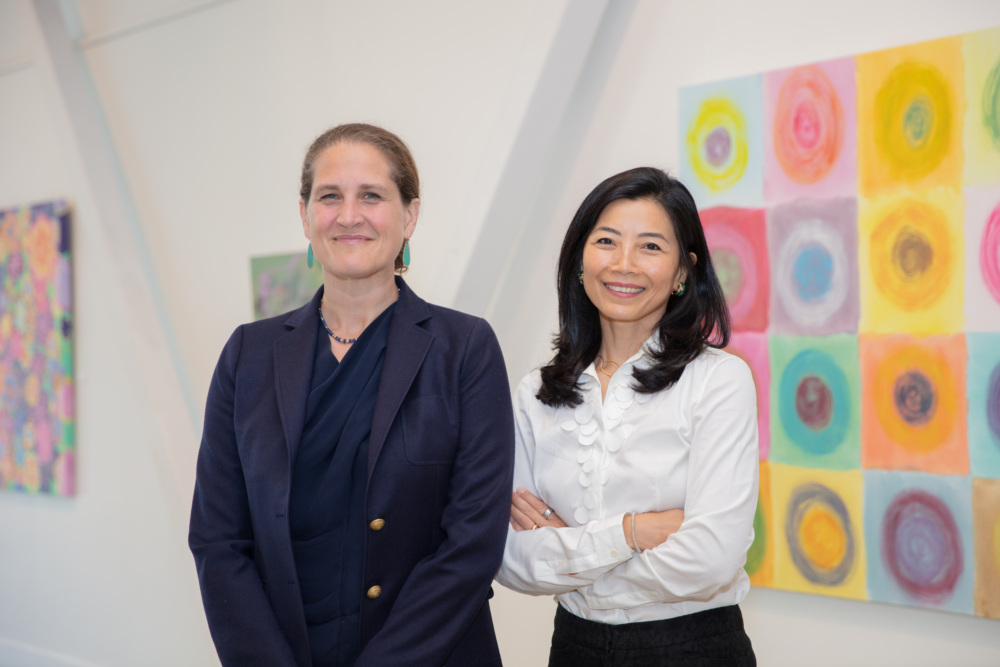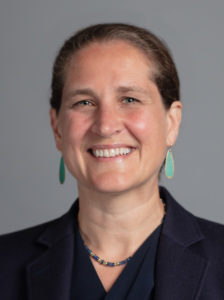

Kirstin Hill joined Social Finance in September 2023 to help shepherd the organization into its next phase of growth. Working closely with CEO and Co-Founder Tracy Palandjian, Kirstin leads the firm’s day-to-day operations and oversees its impact investing and advisory business lines. In this conversation with Tracy, Kirstin discusses how she came to Social Finance and her vision for working alongside Tracy to lead the organization. 
Tracy: You have known Social Finance for almost a dozen years. What drew you to our organization?
Kirstin: I met you, Tracy, in 2012 when Social Finance was looking to launch a Pay For Success project in New York State. I was at Bank of America at the time, and you convinced us to join Social Finance for that remarkable journey.
Social Finance’s model was eye-opening: you were deploying capital in innovative ways to various impactful ends, and you were bringing together uncommon partners to achieve those ends. I was drawn to the team’s creativity, tenacity, and willingness to innovate.
Tracy: In the past three years, we have grown to more than 100 employees, opened our fourth and fifth offices, and developed several new products. What excites you most about joining us in this moment of growth?
Kirstin: I am excited to help sustainably scale the work Social Finance is doing. If we can do that, it means we can do more good for more people. I think the opportunity and the challenge for us will be to protect the organization’s many great cultural attributes—the spirit of entrepreneurship, the culture of creativity, and the nimbleness of practice—while also creating scaffolding that allows our work to be increasingly repeatable to achieve impact at scale.
I am excited to help sustainably scale the work Social Finance is doing. If we can do that, it means we can do more good for more people.
The good news is that there are multiple dimensions in which our work can and will scale: there’s the direct scale potential of the investments, and there’s the impact we can have across the country and across disciplines through our advisory work. We can advise the public sector on how to put outcomes first. This has the potential to have a meaningful impact long after our direct engagement ends.
Tracy: Our investment products allow investors to prioritize direct social and environmental impact over financial return. From your multi-decade experience in wealth management, what do you see as Social Finance’s role in the evolution of impact investing?
Kirstin: Impact investing has developed enormously in the past two decades, but it is still fundamentally new. The idea of impact first investing, which is central to Social Finance’s mission, is not yet mainstream. I think, with our creativity and credibility in the marketplace, we are very well positioned to change that and to establish a new market segment around impact-first investing.
Tracy: As you know, a lot of our work focuses on rethinking workforce development to increase economic mobility. Why is expanding access to opportunity important to you?
Kirstin: I believe it is a flaw of our current system that the people with the greatest need bear the most risk in their journey to achieve economic security. By creating training opportunities where learners don’t pay unless they make a set salary, we’re making it easier for people to embark on new career paths.
Equally important are the ways in which this work expands opportunity. Our programs can enable someone to upskill and secure a good job, which might also put them in a position to participate differently in their community or leave a relationship that is unhealthy—there are so many meaningful outcomes when you empower people to move up the income ladder. You can call it workforce development, but the impact goes beyond that.
There are so many meaningful outcomes when you empower people to move up the income ladder. You can call it workforce development, but the impact goes beyond that.
Tracy: Speaking of mobility, you began your career at Merrill Lynch as an intern and ultimately rose to COO. What kind of mentorship and advice was most valuable in your career?
Kirstin: Two things have been very meaningful in my career. The first is curiosity, both about the work itself and the people I work with. Who are they? Where do they come from? What motivates them everyday? The second is the importance of soliciting and accepting feedback. Even if that feedback is hard to hear, even if I don’t agree at first, almost without exception I find I benefit from having received it.
Tracy: In your previous role, you were an outspoken advocate for DEI, which we believe is critical to all that we do at Social Finance. How do you plan to carry this commitment forward into your leadership here?
Kirstin: I believe that leaders have the responsibility to use their platforms to make space for and amplify voices that might not otherwise be heard. There was a board member at my previous organization who would always say, ‘there’s always room for another chair, just pull up a chair.’ That’s one way I think about it.
I also believe that any DEI journey, internally or externally, has to start with an authentic desire to understand the people around you. And that listening can’t be a one-and-done. It has to be followed with true partnership, which means taking the time to collaborate, to incorporate what you’ve learned, and to do the work.
Tracy: Ending on a light note, what do you like to do on weekends?
Kirstin: I love reading fiction! Specifically novels of any genre. I love how they transport you into someone else’s shoes. I think they are the best tool for building empathy.
Learn more about Kirstin →
Related Insight

Social Finance Impact First Fund Q4 2025 Report
The Social Finance Impact First Fund is pleased to share our Q4 2025 quarterly report, which covers Fund activity through December 31, 2025. The Impact First Fund is built to deliver flexible, risk-tolerant capital to innovative…